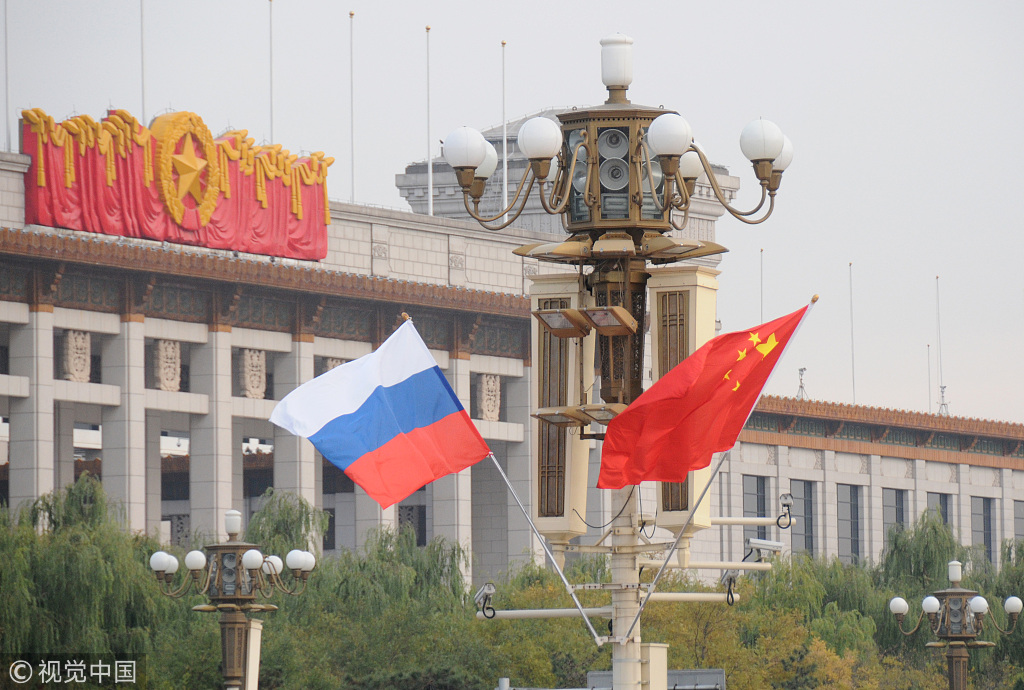BRI has bolstered China-Russia relations


The Belt and Road Initiative, or BRI, has significantly expanded the China-Russia cooperation, and it has facilitated the alignment of development strategies between the two countries raising bilateral relations to a higher level, said Li Hui, Chinese ambassador to Russia.
The diplomat made the remark in an interview with China Daily ahead of Russian President Vladimir Putin's trip to China for the second Belt and Road Forum for International Cooperation slated for April 25 to 27 in Beijing.
Putin's participation in both the first and second forums demonstrates that the China-Russia ties are special, Li said. The first forum took place two years ago in Beijing.
The BRI, proposed by Chinese President Xi Jinping in 2013, is actively supported by Russia, Li said, saying that Putin believes the initiative is timely and promising and in line with the goals of Russia's Eurasian Economic Union.
President Xi and Putin signed a joint declaration on cooperation in linking the construction of the Silk Road Economic Belt and the Eurasian Economic Union, or EAEU, in May 2015, drawing a blueprint at a strategic level for the development of bilateral relations.
The BRI aims to build connectivity between Asia and Europe, Africa and beyond. The initiative comprises the Silk Road Economic Belt and the 21st Century Maritime Silk Road.
Established in 2015, the EAEU groups, namely Armenia, Belarus, Kazakhstan, Kyrgyzstan and Russia, seeking to optimize the flow of goods and services among its members.
Under the framework of the BRIEAEU alignment, China and Russia, with complementary economic advantages, have further tapped their potential and embarked on cooperation in different sectors, according to the envoy.
China-Russia trade exceeded a record $100 billion last year, Li noted, adding that the two countries have consolidated cooperation in sectors of nuclear energy, aerospace and infrastructure.
Both countries have also worked together in the high tech, agriculture, e-commerce and finance sectors to expand the two-way trade.
Landmark projects, including the China-Russia east route natural gas pipeline, Tongjiang Railway Bridge and a cross-border highway bridge, are expected to be built and put into operation this year, Li said.
Li said that BRI has also helped the two countries facilitate people - to -people exchanges and strengthen public opinions for a stronger bilateral relationship.
In recent years, bilateral cultural exchanges have kept moving forward, and the two countries have held such state-level activities as the Year of Tourism, the China-Russia Youth Friendly Exchange Year, the China-Russia Media Exchange Year, and the year of China-Russia local cooperation and exchange, which have greatly promoted mutual understanding between the two peoples.
Chinese tourists made 1.8 million trips to Russia last year when Russian travelers made nearly 2 million trips to China, said Li, stressing that the two countries have become major sources of tourists and travel destinations for each other.
Currently, China and Russia are both working for the same goals of promoting economic growth and improving people's livelihood to realize national rejuvenation, said Li, adding that the two countries need to grasp the historic opportunity, and take the joint construction of the BRI as a chance to constantly expand two-way direct investment and step up economic cooperation.
From forging their diplomatic ties to establishing a comprehensive strategic partnership of coordination, the China-Russia relationship has seen 70 years of remarkable development, said Li, adding that the two sides have continuously deepened their ties.
He called on the two sides to abide by the spirit of the China-Russia treaty of good-neighborliness, deepen mutual trust and lift China-Russia partnership of coordination to a new level.































